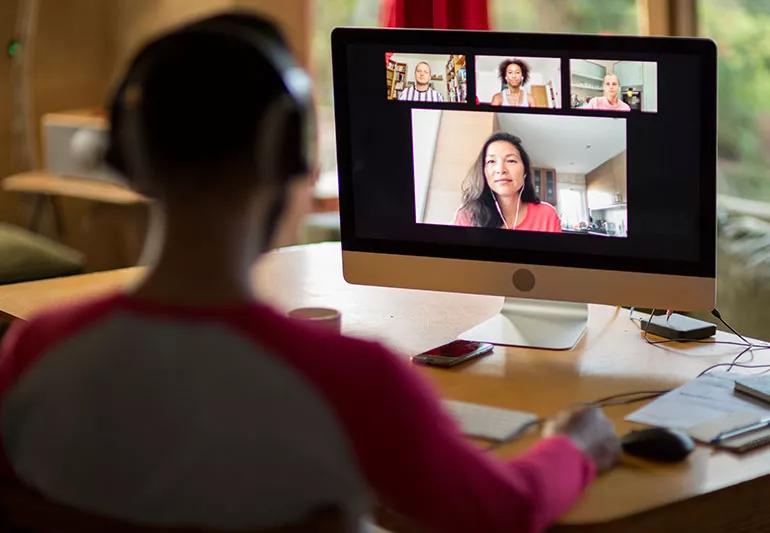6 tips to make video chat feel less tiresome

You log on and suddenly 12 floating heads are staring at you. Why is there an echo? Are you muted? Someone is trying to share their screen, but you just glanced at your own picture – your hair is a mess! Wait, are you frozen? Oh no, your kid just walked into the room. You motion for them to army crawl on the floor past the camera…
Advertisement
Cleveland Clinic is a non-profit academic medical center. Advertising on our site helps support our mission. We do not endorse non-Cleveland Clinic products or services. Policy
Online video calls can be tough.
You’re juggling technology, interruptions and the weird struggle of trying to pick up on (and convey) social cues through a screen. Plus, the constant gaze of your boss and coworkers can be a little awkward.
Combine all this video weirdness with back to back virtual meetings or class and it’s enough to make even the most extroverted and tech-savvy among us feel drained. It’s no wonder that many of us feel exhausted after a day of remote work. (We didn’t used to feel this tired, right?)
Unfortunately, thanks to coronavirus, video chat and virtual learning won’t be going anywhere anytime soon. Behavioral health therapist Jane Pernotto Ehrman, MEd, RCHES, ACHT, shares insight and advice for surviving this pandemic phenomenon known as Zoom fatigue.
From Skype to Zoom, there’s a lot going on when we log onto a video call. Our brain is trying to navigate technology while we process what we’re seeing and hearing, but our brain is also trying to process social interaction through a screen.
That’s because most of the nonverbal cues that we used to rely on during in-person conversations – like eye contact, body language or an indication that someone is about to speak – can’t be easily picked up over video. Our brain is registering all this as some sort of weird disconnect.
Advertisement
“When you’re speaking to someone in-person, you can gauge their energy, see their body language, hear the tone of their voice and understand the social context,” says Ehrman. “But when you’re communicating through video, it’s a whole different environment. It can feel like you’re in outer space.”
Video chat is also a classic example of trying to multitask. Because here’s the thing, our brain can’t multitask, no matter how hard we try. Even when we think we’re multitasking, we’re aren’t actually doing two things at once, but instead just doing separate actions quickly.
In fact, attempting to multitask has been linked to weaken long-term memory, increased depression and anxiety and the inability to distinguish between important and unimportant interruptions.
No wonder you feel like your productivity and focus starts to dip as the day (and the virtual meetings) go on.
With video chat, there’s a higher level of effort and focus involved, says Ehrman. When you talk to someone in-person, you don’t have to try so hard to show your emotions or appear a certain way. Now, it’s much more difficult to convey happiness, interest or even disagreement through a screen.
Maybe you’ve noticed that anytime you’re on video you plaster a smile to your face or nod so often your neck starts to hurt. You’re just trying to express that you understand what is being said to you, but this repeated effort and feeling like you need to perform can be incredibly draining.
It’s now also more challenging to have normal office chitchat over video. You know, catching up with a friend in the hallway, asking your coworker about their new puppy or simply making a joke in a meeting.
Despite staring at giant heads in front of you, video chat can feel isolating and impersonal, especially for those who find joy or get motivation from the physical environment around them.
If the social disconnect (and honestly, just plain awkwardness) of video chat is draining your energy and causing anxiety, consider these adjustments and tips:
Advertisement
Advertisement
Learn more about our editorial process.
Advertisement

Try breaking down tasks into manageable to-do lists and relying on time management techniques

Working beyond your limits can increase illnesses and accidents related to your physical and mental well-being

Help calm the angst that can come with the start of a new work week by adopting a positive mindset, planning an activity and getting some exercise

Taking a stand throughout the day can lower your risk of disease while improving your energy, focus and productivity

A hostile work environment can foster a culture of aggression, doubt and negativity that’s harmful to your health and success

Not having paid sick leave, working night shifts and lacking consistency in schedule or pay can cause serious psychological distress

Schedule breaks, stand and stretch, and rely on alarms, to-do lists and other tools to help keep you focused

Work burnout can leave you exhausted and frustrated at work and beyond, but you can beat it by setting boundaries and surrounding yourself with positivity

Wearing a scarf, adjusting your outdoor activities and following your asthma treatment plan can help limit breathing problems

Your diet in the weeks, days and hours ahead of your race can power you to the finish line

When someone guilt trips you, they’re using emotionally manipulative behavior to try to get you to act a certain way